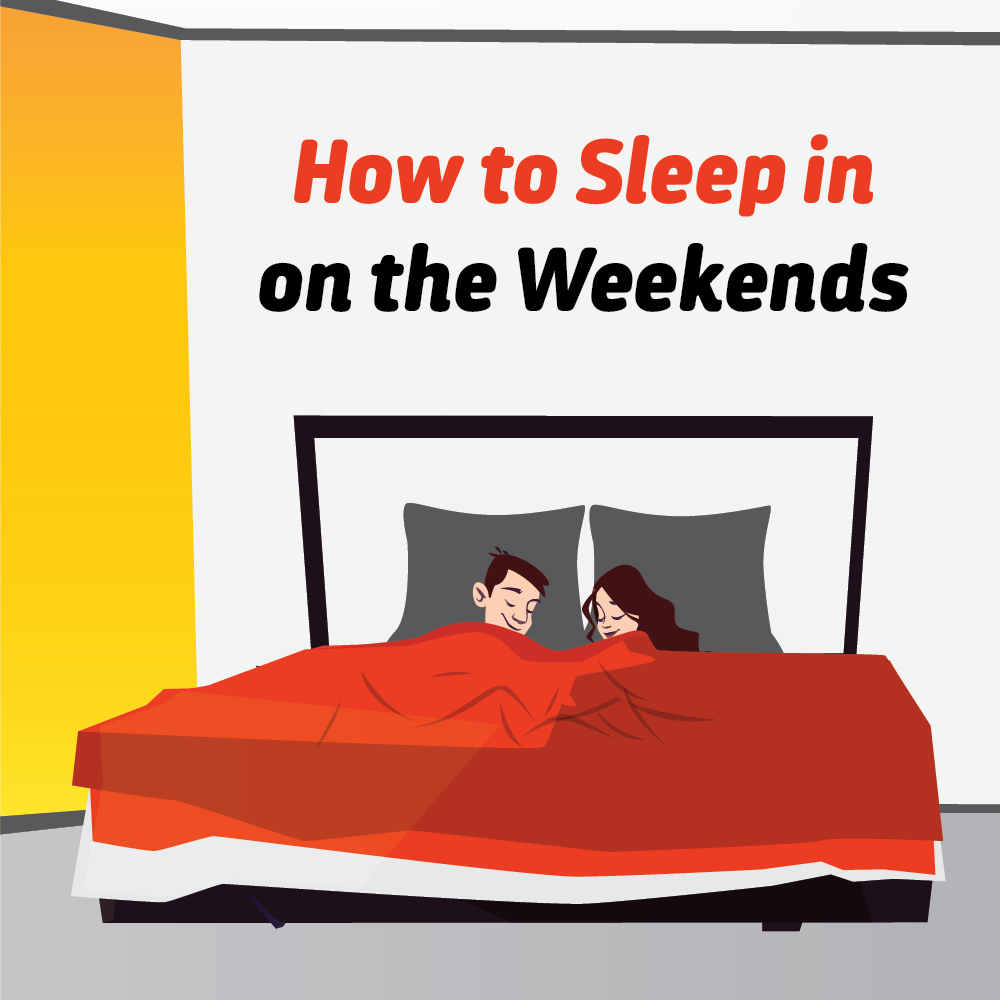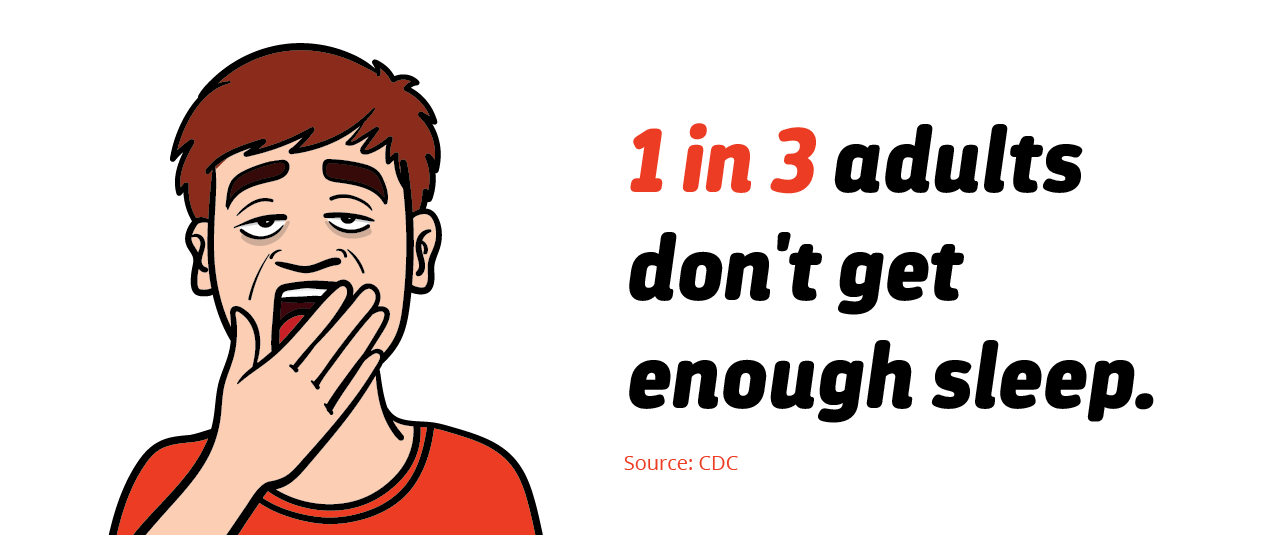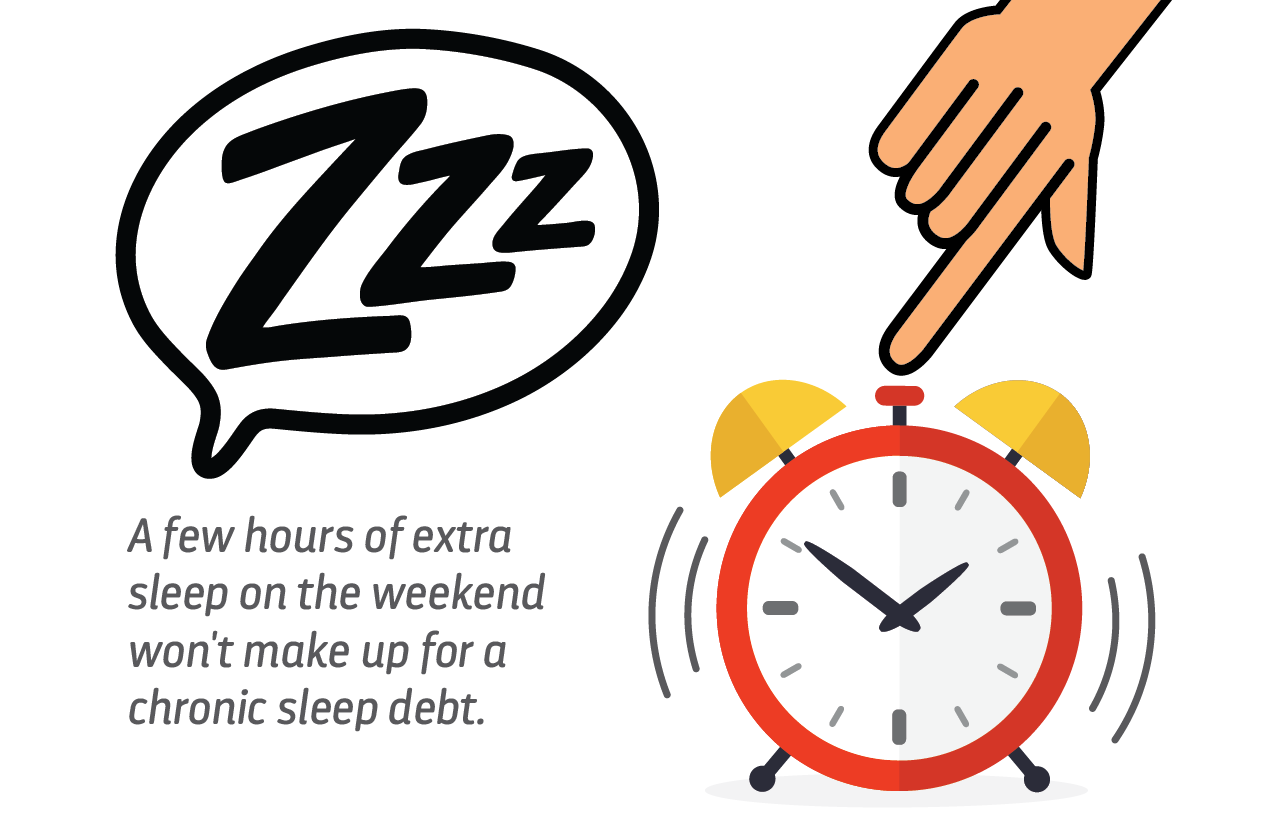Everything You Need to Know about Sleeping in on the Weekend


How to Sleep in on the Weekends
For many people, the best part of their workweeks is that feeling of total possibility on Friday, pretty much weekend-eve. You have a full weekend ahead of your work activities, catching up with friends and family, and doing all of your hobbies. But, depending on how tired you are, the most treasured aspect of the ensuing weekend might be the ability for you to sleep in. After all, you’ve been working hard all week, making all your deadlines—why not treat yourself to several hours of extra sleep on the weekend? Well, not so fast, Bucko.
The topic of sleeping in on weekends isn’t so black and white in terms of what’s “good” for you and your body. Below, we’ll dive into the healthiest way to sleep in and more importantly, how to address the chronic sleep debt that might be the root cause of your weekend slumberfests.
How much should you sleep in on the weekends?
In most cases, it’s best to avoid varying your wake-up time by more than an hour on the weekends. If you can stick to your normal schedule and pop out of bed during your typical waking time, that’s even better. A better way to deal with feeling groggy is prioritizing sleep during your workweek and supplementing your sleep with short naps between 2:00 and 3:00 pm, which is the time period when most people naturally feel a dip in their energy levels.
So, why can’t you just sleep for an extra three hours and call it a day? Well, there’s evidence that recouping your sleep during the weekend doesn’t actually make up for chronic sleep debt. It might help you feel less stressed and groggy in the short term, but ultimately, the sleep loss effects are cumulative and build up over time. One day of extra sleep doesn’t wash away weeks, months, or years of poor sleep.
Sleep experts have argued that you can’t think of sleeping as a financial transaction where you can deposit a little extra sleep here to make up for significantly less sleep elsewhere. Instead, it’s a better idea to think of sleep as a long-term investment—after all, that’s essentially what it is in terms of your health.
The length and quality of your sleep affect the overall health of your body and the well-being of your mind. Small dips in your “stock” here and there won’t affect your body as much, but a major downturn in the market in the form of chronic sleep debt will have serious consequences on your health and happiness.

Why do I sleep so much on the weekends?
After a week of work that forces you to wake up early and obligations that keep you up late at night, it’s natural to have a strong sleep drive during the weekends. But don’t think of your fatigue as an excuse to have a marathon-sleep that ruins your sleep schedule. Instead, use the tiredness you feel as motivation to start changing your habits so you can feel better during the week and reduce your impulse to sleep in on the weekends.
Is sleeping in healthy?
Sleep experts can’t agree completely on this one either way. In some cases, there doesn’t seem to be a clearcut answer. For example, a study that was published in the Journal of Sleep recently conducted a study with 38,000 people. The study participants charted the hours of sleep they got each night, without taking into account the differences between the weekend and workdays.
The results were that people under the age of 65 who get less than 5 hours of shut-eye a night during the week didn’t live as long as those who slept for 7 or more hours each night. With that said, the study found that when people in the study slept less during the week got extra hours on the weekend, they lived for as long as the people who got adequate amounts of sleep.
There’s also evidence that the compensation of sleep during the weekends and holidays may partly ameliorate the risk of childhood obesity.
Other sleep experts still extoll the value of a consistent sleeping schedule built around a predictable bedtime and waking time. Studies have suggested that chronic insomniacs suffer from more incidences of disease and are significantly more likely to develop mental health problems.
Why is sleeping in bad for you?
At the end of the day, sleeping in is bad for you because it disrupts your circadian rhythm. With that said, sleeping in once in a while isn’t going to be an immediate death sentence—you’ll likely just feel more tired than usual as your body adjusts to waking up early during the week again. Some sleep experts have termed this “social jet lag” since your sleep schedule gets disrupted after obligations keep you up and force you to wake up early, which compounds the issues from your lack of sleep.
Is it bad to sleep to oversleep
If you really go all-out and sleep for nearly an entire day, the short term effect won’t necessarily be bad—although your circadian rhythm might end up being extremely skewed and disrupted. As a result, it will take longer to fall back into a regular sleeping pattern again.
However, it’s bad for your health to get too much sleep regularly in addition to too little, as it turns out. Researchers have found through various studies that long sleepers are at risk for psychiatric diseases and a higher BMI.
There’s also evidence that people who oversleep have higher inflammation factors that are related to everything from heart disease to diabetes. Although there are other variables involved in these health issues, oversleeping can exacerbate the risk factors and make it more likely for you to develop more serious problems.
Here are all the issues associated with oversleeping:
- Cognitive impairment
- Depression
- More pain
- Fertility problems
- Higher risk of obesity
- Higher risk of stroke
- Higher risk of diabetes
- Higher risk of heart disease
- Higher risk of mortality (from all causes)
Only 2% of the population is naturally programmed to sleep for more than 9 hours. So, if you’re getting more than 9 hours of sleep at night and still don’t feel rested in the morning, there might be an underlying issue that needs to be resolved. If that’s the case, consult with a physician.

How do I avoid sleeping so much on the weekends?
To stop your bad habit of sleeping in on the weekends, consider making some serious changes to how you sleep during the week. Take a look at our tips below:
1. Create a comfortable bedroom. Add comfortable, quality bedroom accessories like an adjustable base bed and bamboo sheets.
2. Reset sleeping schedule slowly. If you need to reset your sleep schedule during the week, try to change your bedtime and the time you wake up in 15-minute increments.
3. Practice consistency. Once you have your bedtime and wake-up time established, stick to that consistent schedule as much as you can. Your body thrives on routine and will respond well to consistency. Want to wake up the following morning feeling like that overly-happy person in cereal commercials? Then it’s time to get serious about your sleep and bedtime.
4. Add in a nap or two during the week. If you’re constantly tired during the week, it may be a good idea to add in a nap or two. Ideally, you’ll nap when your energy is naturally at its lowest, in the late afternoon. If you take a nap too early or too late, that can disrupt your sleep schedule as well.
5. Streamline your chores and errands. Make choices during the week that promote a regular sleep schedule. Can you order your groceries online? Can you procrastinate a little less and forgo your hours-long scrolling of Instagram to meditate and get ready for bed? Think about how your choices will impact your sleeping and overall health.
6. Limit how much work you take home. Do you take your laptop with you at home to get more work done at your house at night? Consider creating a stronger boundary between your work and home life. Stress and staring at a screen late into the evening hours can really impact your ability to sleep and the quality of that sleep.
Takeaways: Sleep in on the weekends… occasionally
We get it—your weekdays are exhausting. Work, family, exercise, your social life, and any other variables in your schedule can result in little to no sleep. But it’s incredibly important to keep a set schedule so your body can better anticipate your rest and waking patterns. With a consistent sleep schedule and adequate amounts of sleep, you’ll start feeling happier and healthier.






